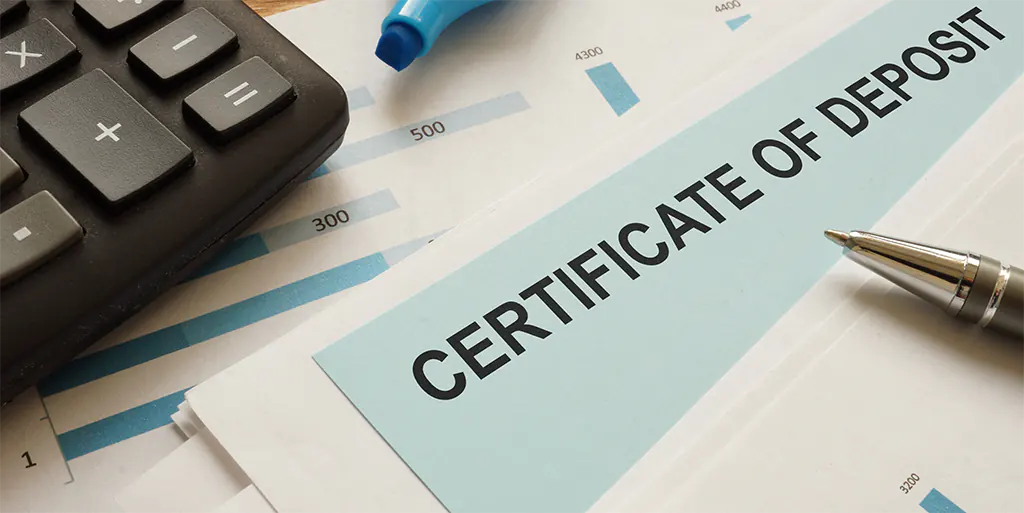UPDATED: May 2, 2022

A certificate of deposit, or CD, is a type of savings account found at commercial banks and credit unions. You lend money to the bank, in return you receive periodic payments based on a stated rate of interest.
The bank usually requires you to leave the funds in the CD for a predetermined term. Terms can range from three months to 60 months or more. All else being equal, the longer term CDs will pay a higher rate of interest.
If you need access to your funds prior to the maturity of the CD term, many banks will charge early withdrawal penalties. Make sure you understand the early withdrawal penalty language prior to purchasing a CD, especially if you might need the funds early.
Table of Contents
How Safe are Certificates of Deposits?
Since CDs are not invested in financial markets, they are traditionally a safe place to keep cash. The FDIC insures up to $250,000 at commercial banks. The National Credit Union Administration provides the same protections at credit unions. Anything above $250,000 would be subject to potential loss something seriously bad happened to the bank. Losing your principal investment in a CD is rare, but it does happen. This is why some people spread their CD investments across many financial institutions when they have more than the protection covers.
Why Would Someone Buy a CD?
The most common reason is to get a higher interest rate on cash, especially compared to a checking or savings account. You get a higher annual percentage yield (APY) because the bank knows how long you’ll be keeping your money in a CD.
The term of the CD will also impact how much interest you receive. Typically, the longer the term of the CD, the higher rate of interest you will receive.
Who Invests in Certificates of Deposits?
CDs are traditionally for risk-averse savers that want to earn some interest, but want safety and peace of mind that their investment won’t lose value. Because they’re low-risk investments, CDs tend to be associated with older investors.
A CD could be a good place to stash short-term cash that’s earmarked for an upcoming goal. For example, down payment for a house, home remodel, major purchase, etc. Others use CDs as their emergency fund, a forced savings vehicle that could be tapped if one loses their job, medical expenses, or any other unexpected expense.
If you need cash prior to the maturity of the CD, penalties might apply which could wipe out interest earned. Savers that need quick access to cash, also known as liquidity, should probably look for another alternative.
How Much Should I Invest in a CD?
Some banks have minimum deposits, which are usually around $1,000. Other banks and credit unions offer no minimum deposit CDs. Your relationship with the bank could factor into the decision. For example, if you have sizable wealth management balances, the CD minimum could be waived.
What About Online Certificate of Deposits?
Reputable online banks have sprouted up with the proliferation of the internet. Make sure the online bank is covered under the FDIC or NCUA $250,000 insurance limits. Check out the bank's online reviews for insight from other consumers. Online banks tend to offer higher interest rates because their overhead is much lower than a traditional brick and mortar bank.
Do CDs Keep Up With Inflation?
Inflation is impacted by several economic factors and changes with time. A CD isn’t really meant to be a wealth creating engine, rather a safe place to stash cash that is needed in the short-term. If you can tolerate risk and have a multi-year runway, there are more attractive investment options.
What to Consider When Choosing a CD
A logical place to start shopping for a CD is your primary bank. You can ask a teller or personal banker for the day's CD rates. You can also find daily rate info on the bank’s website. If you’re comfortable with using an online bank, many personal finance sites will have a tool to search for the highest CD rates available. The rates are usually more attractive online. Your big Wall Street bank is rarely going to offer the highest rate.
If you need the money in the short-term, say in the next 3-6 months, you should stick to a money market or traditional savings account. You avoid incurring harsh withdrawal penalties if you need the cash before the CD matures.
Even if you decide you won’t need the money in the short-term, make sure you understand the withdrawal penalty language prior to investing. In a perfect world, you would invest in the highest interest rate CD with the shortest term!
How Often do CDs Pay Interest?
Interest is typically credited to your account on a monthly, quarterly, semiannual or annual basis. After the CD term matures, you can agree to new terms, shop for a new CD, or take your cash. Some banks also allow you to have your earned interest deposited directly in your checking account, even before the CD matures.
If you own the CD outside of a retirement account (which is the most common), the interest income you receive will be taxable at the Federal and State level (the rate will depend on where you live). The financial institution where you bought the CD will provide you with Form 1099-INT or 1099-OID.
What are Common CD Terms?
The most common CD terms range from 12 months to 60 months (five years) with everything in between. Unless you receive a very favorable long-term rate, sticking to 12 month or 24 month CDs is recommended. You wouldn’t want to lock up funds for too long as interest rates could go higher and you would be stuck in a lower rate CD, unless you think rates will go down in the future.
What Factors Impact CD Rates?
The Fed funds rate, U.S. Treasury bond yields, need for capital among banks, inflation, and other economic factors impact CD rates. Banks are taking your money and lending it out to earn a return. They must earn a positive spread between what they earn in interest and what they pay CD depositors.
What Happens If I Do Nothing After a CD Matures?
Some CDs have an auto-renew feature. There will usually be a grace period of 7-10 days that allow the account owner to take the funds. If nothing is done after the grace period expires. The CD will automatically renew to a new CD term and market rate of interest. Otherwise, the money is transferred to your bank account.
Are CD Rates Fixed?
Traditional CDs come with a fixed interest rate that's locked in for the entire term. Some banks and credit unions offer specialty CDs that allow flexibility. Below are a few examples of specialty CDs:
- Step-up CDs: Accounts that allow the annual percentage yield to increase automatically at set intervals.
- Bump-up CDs: Fixed-deposit accounts that permit an interest rate increase during the term.
- Brokered CDs: Investment accounts that are opened through a financial advisor (beware of how the advisor is compensated for purchasing a CD on your behalf).
- Add-on CDs: Certificates of deposit that allow account holders to make multiple deposits before the maturity date.
The most common certificate of deposits offered by banks and credit unions are fixed rate. Typically, fixed rate CDs do not allow additional deposits once the original CD has been funded.







Leave a Reply